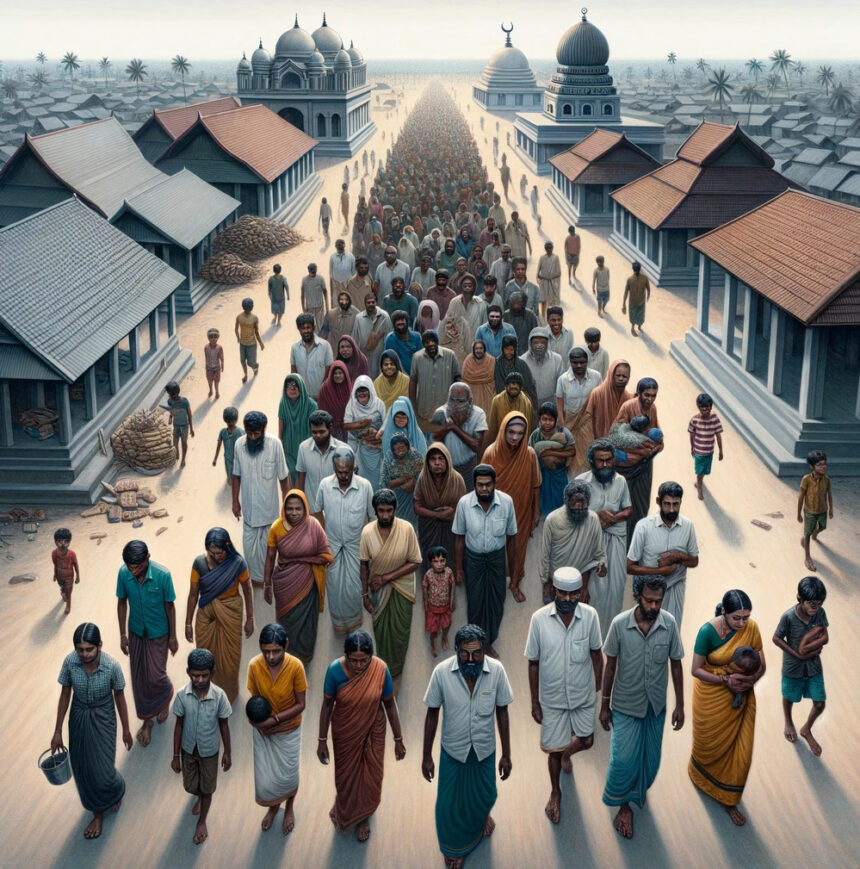Reflecting on my upbringing in Jaffna during the late 1980s, my understanding of our community underwent a profound transformation during a visit to Colombo in 2002. It was at the ‘Peace Bridge’ event amidst a fleeting pause in the conflict, where I first meaningfully interacted with the Muslim community. Meeting a fellow student who shared his early years in Jaffna disrupted my previously held belief that Jaffna was solely Tamil.
This encounter sparked a deeper curiosity about the diverse tapestry of Jaffna’s past. A poignant symbol of this was found in the annals of the Jaffna Hindu College’s sports record book. Amid its pages, the name ‘Zabarullah’ stood out, a re-cord holder in the 100, 200, and 400-meter races from the 1970s. This intriguing discovery raised questions about the heritage and contributions of Muslims in Jaffna’s prestigious institutions.

My journey then led me to the stark reality of a refugee camp in Puttalam, Sri Lanka, where I met Abdul Rahim. His story, a testament to the rich, multicultural fabric of Jaffna, painted a vivid picture of a life that once was. Born in 1965, Abdul Rahim’s childhood was one of cultural harmony. His Muslim identity seamlessly intertwined with the Hindu traditions around him, from celebrating Deepavali to participating in
the Nallur Kandaswamy Kovil Festival. The communal spirit extended to religious observances as well, with
Hindu neighbors drawn to his home by the tantalizing aromas of Ramadan feasts.
This harmony extended to the political aspirations of the time. Abdul Rahim’s family, along with a significant segment of Jaffna’s Muslim community, fervently supported the vision of Tamil Eelam. This commitment was not just ideological but deeply personal. His elder brother, Muhammad Sabir, was an active member of the LTTE cadre, dedicating his life to the pursuit of this shared dream. However, this
shared dream was brutally upended in October 1990 when the LTTE, in a drastic and tragic turn of events,
turned against the Muslim community in Jaffna. The ultimatum issued was not only to leave their homes within two hours but also to leave behind a lifetime of memories and possessions. In this forced exodus,
the community was stripped of both their physical belongings and a significant part of their identity.

As a Tamil from Jaffna, I feel it is incumbent upon us to acknowledge our collective responsibility in this heinous act. Our silence and inaction contributed to the perpetuation of this injustice. The time is now for the Sri Lankan government, Tamil diaspora, and concerned authorities to facilitate a peaceful return for these displaced individuals. I is a moral imperative to restore the dignity and rights of those uprooted, ensuring their rightful place in the land they once called home.
In our series of articles, we delve deeper into this dark chapter of Sri Lankan history, aiming to shed light on the stories of those affected and the path to reconciliation and restoration. It is a journey of coming to terms with our past, confronting uncomfortable truths, and striving towards a future where such tragedies are never repeated.



